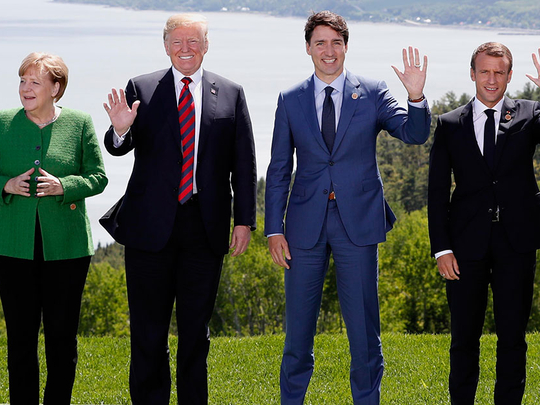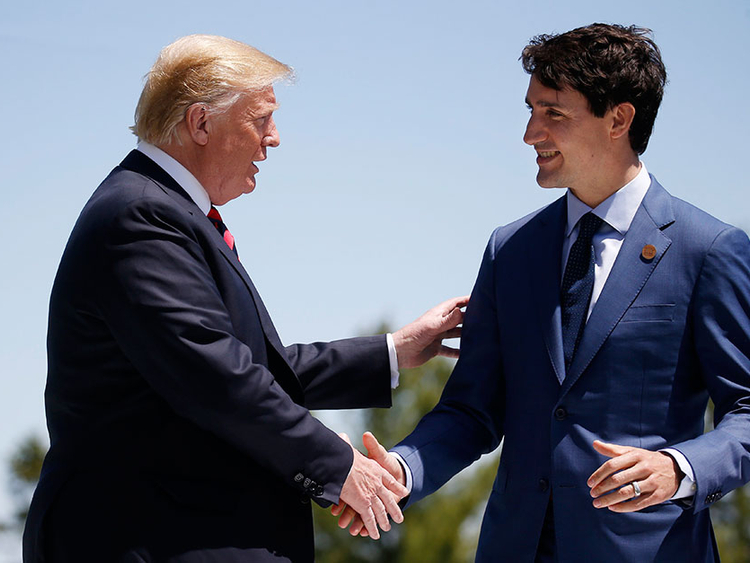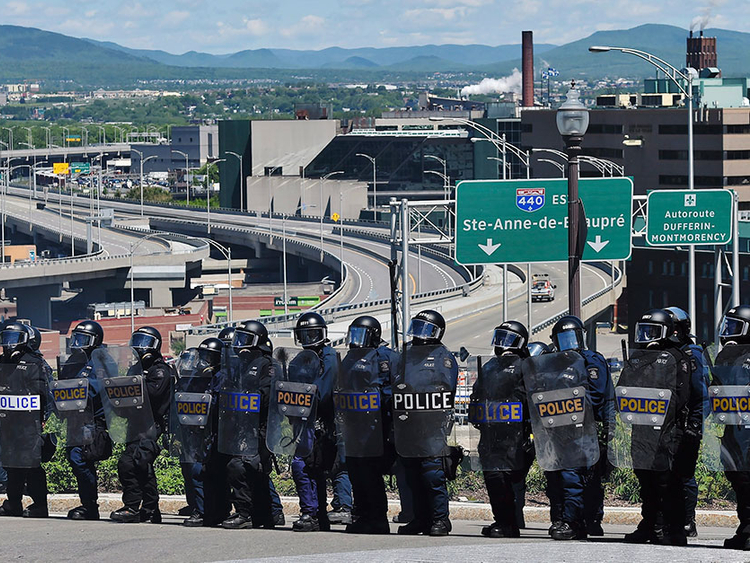
La Malbaie, Quebec: President Donald Trump charged into a summit of major industrialised nations on Friday for contentious trade talks, injecting fresh drama into an already tense meeting by calling for the reinstatement of Russia, which was ousted for its annexation of Crimea.
Follow live updates from the meeting below, all in UAE time:
1.30am
Trump says progress made in trade talks with Canada at G7
US President Donald Trump said progress had been made in trade talks with Canada Friday, as he met the country's prime minister on the margins of a G7 summit in Quebec.
"Justin has agreed to cut all tariffs and all trade barriers," Trump joked as he sat smiling beside Prime Minister Justin Trudeau, whom he had criticized just hours before.
"We've made a lot of progress today" Trump said more seriously, while claiming that relations between the neighbors had never been better.
"It could be that NAFTA will be in a different form," he added while talking about attempts to renegotiate a regional trade pact, predicting "something very beneficial" for both countries.
12.34am
US trade tariffs 'illegal': G7 host Canada
The US imposition of tariffs on exports of steel and aluminum from its allies is illegal and will be met with retaliation, Canada's government said Friday as it hosted a summit of G7 leaders, including Donald Trump.
"Canada will not change its mind when it comes to the illegal and absolutely unjustified application of tariffs on steel and aluminum, not only coming from Canada, but on the steel and aluminum sold by all the G7 allies who are assembled here," Foreign Minister Chrystia Freeland said at a press conference on the first day of the summit.
11.55pm
Ukraine is the dealbreaker
The European members of the G7 are agreed that Russia cannot be readmitted into the club until there is an improvement in the crisis in Ukraine, German Chancellor Angela Merkel said on Friday.
"We are in agreement that a return of Russia to the G7 cannot happen unless substantial progress is made in terms of the problems with Ukraine," Merkel told reporters on the sidelines of the ongoing G7 summit in Canada.
Merkel spoke following a meeting with the leaders of Italy, Britain and France which came in the aftermath of US President Donald Trump's call to readmit Russia.
The decision to kick Russia out of what had been the G8 was in response to Russia's annexation of Crimea in 2014, which was widely denounced as a violation of Ukraine's sovereignty.
11.38pm
Working session begins
President Donald Trump and his world counterparts have opened the first working session of a meeting of major industrialised nations in Canada.
Trump was seated between the host, Canadian Prime Minister Justin Trudeau, and German Chancellor Angela Merkel, and was seen chatting amiably with both.
Others leaders participating in Friday's meeting in Quebec are from Britain, France, Japan and Italy. The European Union also participates in the annual gathering.
Trump has angered most of the leaders in attendance with his stance on trade and other policies.
10.13pm
Final communique
Leaders from the Group of Seven countries are highly unlikely to issue a final communique when a two-day summit in Canada ends on Saturday because of a lack of consensus among the group, who are deeply divided over trade issues.
Several G7 officials told Reuters that a communique - which must be agreed by the leaders of Canada, Britain, the United States, Germany, France, Japan and Italy - will be near impossible to achieve and Canada will issue a chair's summary of the meeting instead.
9.45pm
Trump-Macron have spoken
French President Emmanuel Macron and US President Donald Trump, who exchanged terse Twitter messages ahead of the G7 summit, had a brief "very cordial" discussion about trade and North Korea, a French official said on Friday.
Trump wanted to meet Macron upon his arrival in Quebec and the discussion lasted just over 10 minutes, the official said.
Trump and Macron have already spoken at the G7, per @AFP's Laurence Benhamou. An Elysée source saying they talked about North Korea and trade and it was "très cordial".
— Andrew Beatty (@AndrewBeatty) June 8, 2018
9.20pm
'No Russia at G7'
European members of the G7 unanimously oppose US President Donald Trump's call for Russia to be readmitted into the club, French President Emmanuel Macron's office said Friday.
Macron, German Chancellor Angela Merkel, British Prime Minister Theresa May and new Italian premier Giuseppe Conte agreed on a common stance on Russia during talks together on the sidelines of the summit.
"The common European position is against the return of Russia," one senior aide to Macron told reporters, although the leaders did leave open "the possibility of establishing dialogue" with Moscow.
Conte, who is attending his first summit, had earlier indicated that he was in favour of Trump's proposal to welcome Russia back into an organisation from which it was frozen out after annexing Crimea in 2014.
9.19pm
Donald Tusk calls for support
The chairman of European Union leaders, Donald Tusk, appealed at a G7 summit on Friday for support for Ukrainian filmmaker Oleg Sentsov, sentenced by Russia to 20 years in a prison camp in Siberia for opposing Russia's annexation of Crimea.
The Crimea-born Sentsov pleaded not guilty and denounced the trial as politically driven, amid high tension between Russia and the West over Moscow's role in the crisis in Ukraine.
"Today is the 24th day of his indefinite hunger strike, which he is planning to follow through if his demands of the release of 64 political prisoners are not met," Tusk told a news conference.
"This is why I asked the leaders to show their support for Oleg Sentsov. Our solidarity can save his life," he said before the talks of the G7 leaders of the United States, Canada, Japan, Britain, Germany, France and Italy.
Russia was suspended from what was then called the G8 in 2014 because of its annexation of Crimea from Ukraine.
8.40pm
It's time for lunch
President Donald Trump and other leaders of major industrialised nations meeting in Quebec are working through a lunch featuring Arctic char escabeche perfumed with Labrador tea and a buckwheat salad with red apple, rhubarb, and balsam fir spiral.
That will be followed by veal and a dessert described as a "haskap berry and cedar snowball," with northern saffron creme anglaise.
Three meals hosted by Canadian Prime Minister Justin Trudeau draw heavily on ingredients from the host Charlevoix region, including quail eggs from nearby Baie-Saint-Paul, organic meats and Charlevoix mushrooms.
Friday's dinner will feature Charlevoix duck breast "in all its forms," Canadian lobster tail as well as galloway beef fillet.
8.25pm
Trump meets Trudeau
President Donald Trump has greeted Canadian Prime Minister Justin Trudeau at the Group of Seven meeting in Quebec.
The leaders showed no outward signs of tension over their trade dispute. They had a brief, cordial exchange at the summit site overlooking the St. Lawrence River.
Trump walked along the grounds of the summit and then shook hands with Trudeau and his wife, Sophie Grigoire Trudeau.
The leaders smiled and spoke briefly, with Trump putting his left hand on the prime minister's shoulder.
Trump and Trudeau have been at odds over the US president's decision to impose tariffs on steel and aluminum imports.
Trudeau has called the tariffs "insulting and unacceptable."
BEFORE THE MEET
Solidifying his solo status on the world stage, Trump lashed out at longtime allies over their criticism of his trade policies. He planned an early exit from the G-7 meeting.
Russia was ousted from the elite group in 2014 as punishment for President Vladimir Putin's annexation of Crimea and support for pro-Russian separatists in Ukraine. In the US, special counsel Robert Mueller is investigating whether Trump's campaign colluded with Russia in a bid to sway the 2016 presidential election in his favor.
Trump saluted Canadian Mounties as he was greeted at an airport at a military base in Quebec. He arrived on Friday at the annual gathering, held this year at a picturesque Quebec resort, but will leave Saturday morning before the event is over, heading to Singapore for his highly anticipated summit with North Korean leader Kim Jong-un.
Read also
Resort on Sentosa chosen for Trump-Kim summit in Singapore
Trump has 'productive meeting' with Abe
Gold edges up ahead of G7, but dollar recovery caps gains
The White House announced his travel plans after French President Emmanuel Macron and Canadian Prime Minister Justin Trudeau signaled they would use the G7 event to take a stance against new US tariffs on steel and aluminum imports.
At a joint press conference on Thursday, Macron said: "A trade war doesn't spare anyone. It will start first of all to hurt US workers."
Trudeau, for his part, said Trump's action would hurt American workers as well as Canadians, adding he hoped to get Trump to realise it was "counterproductive."
As tempers frayed, Trump had a ready retort, via tweet: "Please tell Prime Minister Trudeau and President Macron that they are charging the US massive tariffs and create non-monetary barriers. The EU trade surplus with the U.S. is $151 billion, and Canada keeps our farmers and others out. Look forward to seeing them tomorrow."
Later Thursday, Trump tweeted: "Prime Minister Trudeau is being so indignant, bringing up the relationship that the US and Canada had over the many years and all sorts of other things...but he doesn't bring up the fact that they charge us up to 300% on dairy - hurting our Farmers, killing our Agriculture!"
Prime Minister Trudeau is being so indignant, bringing up the relationship that the U.S. and Canada had over the many years and all sorts of other things...but he doesn’t bring up the fact that they charge us up to 300% on dairy — hurting our Farmers, killing our Agriculture!
— Donald J. Trump (@realDonaldTrump) June 7, 2018
A few hours later, he added, "Take down your tariffs & barriers or we will more than match you!"
The president appeared in no hurry to leave for Canada. He walked out of the White House more than half an hour late, spent time greeting supporters gathered on the South Lawn, and then proceeded to take questions from reporters for nearly 20 minutes. He weighed in on everything from the Russia investigating to protesting NFL players and his next pardons.
With a cool reception all but assured, Trump has complained to aides about even having to attend the G-7, especially since his Singapore summit with Kim is just days away. He will leave early Saturday morning, and will skip meetings about climate change, clean energy and ocean protection.
This marks Trump's second summit of the G-7, an informal gathering every year under a rotating chairmanship. The member countries are Canada, France, Italy, Japan, Germany, the United States and Britain. The European Union also attends.
Trump is set to hold a series of group and one-on-one meetings, including with Trudeau and Macron. Trump's arrival in Quebec was delayed by about 45 minutes and the White House said the meeting with Macron was off for now but was working to reschedule it. Macron's office said the meeting would be held later Friday afternoon.
Under Trump, the United States has abandoned its traditional role in the G-7. His predecessors pressed for freer global trade and championed a trading system that required countries to follow World Trade Organisation rules.
Trump's policies have been more protectionist and confrontational, driven by a perception that the US has been the victim of poorly conceived trade deals.
"The rules-based international order is being challenged, not by the usual suspects, but by its main architect and guarantor: the United States," European Council President Donald Tusk said.
Relations have hit such a low that a key question now is whether the seven countries can agree on a joint statement of priorities at the conclusion of the meeting. A gathering of G-7 finance ministers days earlier concluded last week with a message of "concern and disappointment" about Trump from the other six countries. France's finance minister described the group as "far more a G-6 plus one than a G-7."
Macron said Thursday on Twitter, "The American President may not mind being isolated, but neither do we mind signing a six-country agreement if need be."
In Paris, Macron's office said allowing Russia back into the group wouldn't make sense and pointed out that the latest country to impose economic sanctions on Russia was the US.
Tension has been building over a year of policymaking that has distanced the US from traditional allies, including Trump's decisions to withdraw the US from the Paris climate accord and the international Iran nuclear agreement. His new tariffs - 25 per cent on imported steel and 10 per cent on aluminum from Canada, Mexico and the European Union - threaten to drive up prices for American consumers and companies and heighten uncertainty for businesses and investors around the globe.
Canada and other US allies are retaliating with tariffs on US exports. Canada is waiting until the end of the month to apply them with the hope the Trump administration will reconsider.
Meanwhile, talks to renegotiate the North American Free Trade Agreement that eliminated most tariffs and duties between the US, Canada and Mexico appear to have ground to a halt.
Critics argue that the growing US isolation is risky at a time when Trump is making diplomatic overtures with North Korea and in the Middle East and could use the support of allies.
Sebastian Mallaby, a senior fellow with the Council on Foreign Relations, described the relationships between the US and the rest of the G-7 as at a "new level of crisis," saying that it was not just about trade but "a general U.S. attitude toward the system."
Despite the conflict, Mallaby predicted that the countries would still seek to work with the US, calling it "the indispensable country."
Likewise, Macron described the moment as a period of "great challenges," but also defended his efforts to befriend the American president, saying the US is a historical ally and "we need them."














